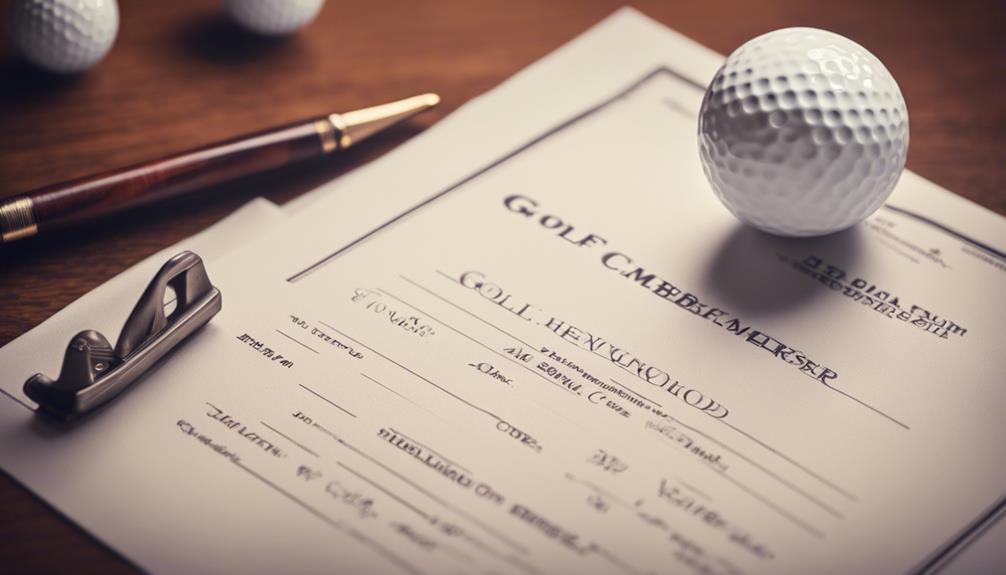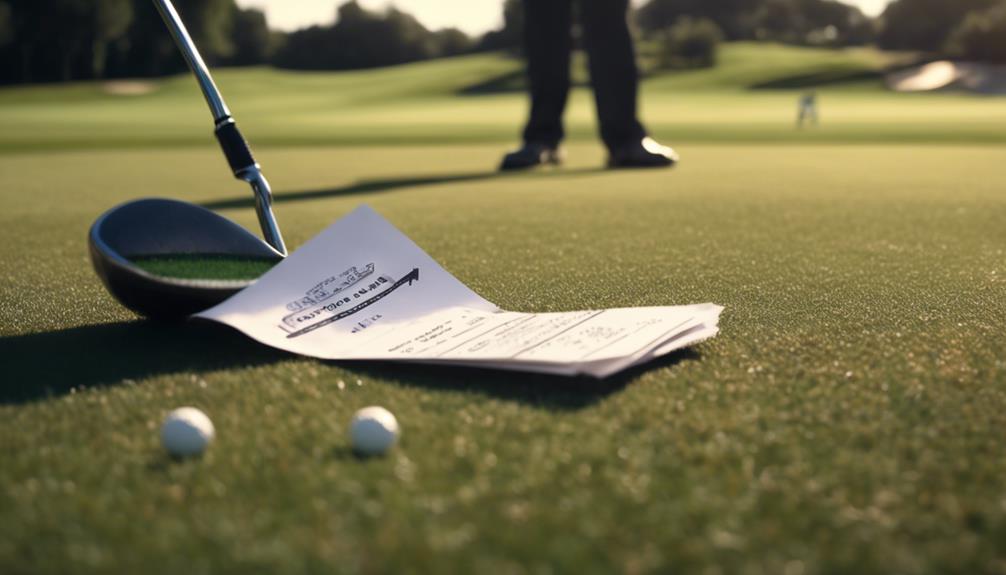- 7 Top Flite Golf Clubs XL for Improved Performance - September 28, 2024
- Top Flite Golf Clubs: Top 5 Reasons to Choose Them - September 28, 2024
- Top 3 Golf Club Fitters for a Perfect Swing - September 28, 2024
You can claim VAT on golf club membership fees, but it's not a straightforward process. The type of golf club you belong to and the purpose of your membership determine the VAT treatment. If you use your membership primarily for business activities, such as client entertaining or staff benefits, you can claim VAT on your fees. However, you'll need to keep accurate records and meet specific rules and conditions to make a successful claim. Understanding the VAT implications of your golf club membership is vital to determine your VAT liability, and there's more to explore to maximize your claims.
Key Takeaways
- Business use of golf club membership allows for VAT claims on membership fees, but specific rules and conditions must be met.
- The membership must be used primarily for business activities, rather than personal enjoyment, to claim VAT.
- Accurate records and documentation are required to support VAT claims, including proof of business use percentage.
- VAT can be reclaimed on business-related expenses, such as entertaining clients, but not for personal use or charitable events.
- The tax treatment of VAT claims depends on the type of business use, and accurate apportionment of VAT liability is critical to guarantee accurate VAT recovery.
Golf Club Membership VAT Rules
When determining the VAT implications of your golf club membership, you must understand the VAT rules that govern golf clubs, as they can substantially impact your VAT liability.
The type of golf club you belong to plays a significant role in determining the VAT treatment of your membership fees. Member-owned clubs typically don't charge VAT on membership fees, whereas proprietary clubs do.
Additionally, the VAT registration status of the golf club affects how it handles VAT on membership fees and expenses. VAT-registered clubs must charge VAT on goods and services, including membership fees.
It's essential to understand that the VAT rate applied to golf membership fees depends on the type of benefits provided.
Exempt supplies, such as education, and zero-rated supplies, like children's clothing, have different VAT rates.
Furthermore, accurate apportionment of VAT on mixed supplies, such as membership fees that include both taxable and exempt benefits, is crucial to ensure compliance with VAT rules and regulations.
Business Use of Golf Membership
As you utilize your golf club membership for business purposes, such as client entertaining or staff benefits, you can claim VAT on the membership fees, but it's vital to understand the specific rules and conditions that govern this type of claim.
The key is to verify that the membership is used primarily for business activities, rather than personal enjoyment.
VAT Claim Breakdown for Golf Club Membership Fees
| Business Use | VAT Claim | Tax Treatment |
|---|---|---|
| Client Entertaining | Claim back VAT | Fully deductible for corporation tax |
| Staff Benefits | Claim back VAT | Partially deductible for corporation tax |
| Mixed Use (Client & Staff) | Split VAT claim | Allocate costs accordingly for corporation tax |
| Personal Use | No VAT claim | Not deductible for corporation tax |
| Charitable Events | No VAT claim | Not deductible for corporation tax |
VAT Recovery on Membership Fees

You need to understand the specific rules governing VAT recovery on golf club membership fees, particularly since proprietary golf clubs charge VAT on these fees and can reclaim VAT on expenses, whereas member-owned clubs do not.
As a golf club member, you're likely aware that VAT can be reclaimed on business-related expenses, such as entertaining clients, but only if the expense is allowable and properly documented.
However, when it comes to membership fees, the rules are more complex. Proprietary golf clubs, which are run for profit, must charge VAT on membership fees and can reclaim VAT on expenses.
On the other hand, member-owned clubs aren't required to charge VAT on membership fees. You must verify your golf club's VAT registration status, as it affects how they handle VAT on membership fees and expenses.
You should also be aware that golf clubs may have different VAT rates for different services, such as green fees and membership fees.
To guarantee correct VAT recovery, golf clubs must keep accurate records and follow HMRC guidelines to avoid penalties.
Partial Exemption for Golf Clubs
As you navigate the complexities of partial exemption for golf clubs, you'll need to determine your business use percentage, which will dictate how much VAT you can recover.
This percentage is vital in apportioning your VAT liability, ensuring you don't overpay or underpay.
Business Use Percentage
Determining the business use percentage is essential for golf clubs, as it directly impacts the amount of VAT recoverable on membership fees. As a VAT-registered golf club, you're entitled to claim VAT on membership fees, but only to the extent that the fees relate to business use.
This is where the business use percentage comes in. It represents the proportion of membership fees that can be attributed to business activities, such as corporate events, client entertainment, and employee benefits.
To calculate the business use percentage, you'll need to assess the club's overall activities and identify the business-related elements. This might involve analyzing membership categories, usage patterns, and event bookings.
You may also need to review the club's policies and procedures, such as membership terms and conditions. By applying a robust methodology, you can establish a reliable business use percentage, which will, in turn, determine the amount of VAT recoverable on membership fees.
Apportioning VAT Liability
Golf clubs must apportion VAT liability between taxable and exempt supplies, a critical process that requires careful calculation to guarantee accurate VAT recovery on partial expenses.
As a golf club, you're required to apportion VAT liability for each VAT return submission to determine recoverable VAT on partial expenses, such as course maintenance costs and general club overheads.
This is where partial exemption calculations come in. You'll need to perform these calculations to determine the recoverable VAT on your expenses.
The annual exemption calculation provides an opportunity to reclaim expenses that may have been unrecoverable throughout the year.
You'll need to perform this calculation for each return to determine recoverable VAT.
The partial exemption tests, including the non-recoverable < recoverable, non-recoverable < £1,875 in the quarter, and non-recoverable < 50% of the total, will determine if all VAT can be recovered on the return.
By apportioning VAT liability, you can confirm accurate VAT recovery and minimize potential losses.
Getting this process right is crucial to avoid any potential penalties or fines.
VAT on Membership Subscriptions Explained

When you're claiming VAT on golf club membership, you need to understand how VAT rates apply to your membership subscriptions.
You'll want to examine your membership fee structure to determine which fees are eligible for VAT reclaim.
Additionally, you'll need to establish clear criteria for eligible expenses to confirm you're taking advantage of all possible VAT recoveries.
VAT Rate Applicability
Your golf club membership subscription may be subject to Value-Added Tax (VAT) at varying rates, depending on the type of club you belong to and its VAT registration status. As a member, understanding how VAT affects your membership fees is vital.
The VAT rate applicable to your membership fees depends on the club's VAT registration status and its type. Three key points are:
- VAT registration status: If the club is VAT-registered, it must charge VAT on goods and services, including membership fees.
- Type of club: Member-owned clubs usually don't charge VAT, while proprietary clubs, which are run for profit, must charge VAT on membership fees.
- VAT rates: The VAT rate for golf membership fees varies, with some clubs charging the standard rate of 20%, while others may charge a reduced rate or be exempt from VAT altogether.
It's vital to note that the VAT treatment of golf membership fees depends on the specific circumstances of the club and its membership structure. Clubs should seek professional advice to comply with VAT regulations.
Membership Fee Structure
You'll want to understand how your golf club structures its membership fees, as this will impact the VAT you're charged.
The fee structure can vary depending on the type of club you belong to. Member-owned clubs, for instance, typically don't charge VAT on membership fees, whereas proprietary clubs, run for profit, must charge VAT on membership subscriptions.
VAT registration status also plays a role in how clubs handle VAT on membership fees and expenses. Some clubs may have different VAT rates for different services, such as green fees and membership fees.
It's essential to grasp the nuances of VAT application on membership fees, as it can affect your overall cost of membership.
You should be aware that golf clubs can reclaim VAT on expenses like course maintenance and supplies, but they must also pay VAT on income.
Understanding the VAT implications of your membership fees will help you make informed decisions about your golf club membership. By knowing how your club structures its fees, you can better navigate the complexities of VAT on membership subscriptions.
Eligible Expense Criteria
Golf clubs must identify which expenses are eligible for VAT reclaim to accurately calculate the VAT amount they can recover on their membership subscriptions. As a golf club, you need to understand the eligible expense criteria to ensure you're claiming the correct amount of VAT. This is crucial since you'll need to charge VAT on your membership fees, and you'll want to reclaim as much VAT as possible on your expenses.
To determine which expenses are eligible, you'll need to review your business activities and identify the costs directly related to your VAT-registered supplies.
You can claim VAT on direct costs such as course maintenance, equipment, and supplies.
You can also claim VAT on overheads like administrative costs, marketing expenses, and utility bills.
You can claim VAT on capital items like new equipment, vehicles, or building renovations.
Apportioning VAT on Mixed Use
When apportioning VAT on mixed use, businesses must separate the costs of goods and services used for both business and non-business purposes to accurately claim back the recoverable VAT.
This is vital because VAT incurred on goods and services used partly for business and partly for non-business purposes must be apportioned.
You can use the Lennartz Accounting method to reclaim VAT on goods used partly for business and partly for private purposes.
Apportionment can be based on the relative cost of providing different supplies to members, and necessary to keep calculations for inspection by VAT assurance staff.
Partial expenses, such as course maintenance costs, require apportionment as they relate to both taxable and exempt sales.
To calculate the recoverable VAT figure, you'll need to add the taxable expense figure to the partial total.
Remember to complete the annual exemption calculation at the end of each VAT year.
Golf Club Events and VAT Liability

Events hosted by golf clubs, such as tournaments, charity fundraisers, and social gatherings, may trigger VAT liability, depending on their purpose and the supplies made to attendees.
As a golf club member, you need to understand the VAT implications of these events to avoid missing out on potential VAT claims.
When attending golf club events, you're often provided with supplies such as food, beverages, and equipment.
These supplies can be standard-rated, zero-rated, or exempt from VAT, depending on the event's purpose.
For instance:
Tournaments: If you're participating in a tournament, the entry fee may be subject to VAT, but the supply of golf course access might be exempt.
Charity fundraisers: If the event is a charity fundraiser, the supplies made to attendees might be exempt from VAT, but the charity's income may be subject to VAT.
Social gatherings: Social gatherings, such as dinner dances, may be subject to VAT on the supplies made, including food and beverages.
It's essential to review the specific circumstances of each event to determine the VAT liability.
You should also consider the membership benefits you receive and how they relate to the events hosted by the golf club.
Understanding the VAT implications of these events will help you optimize your VAT claims and prevent you from overpaying or underpaying VAT.
VAT Implications of Membership Benefits
As a member, you need to understand how VAT laws and regulations impact your membership benefits, including fees, to verify you're claiming the correct amount of VAT.
The scope of VAT on membership benefits is complex and nuanced, and golf clubs must carefully consider their VAT registration status, turnover, and business activities.
As a result, the benefits to members may be subject to VAT, and clubs must account for output tax on membership fees.
You should be aware that VAT rates for different services, such as green fees and membership fees, may vary, and clubs may have different VAT rates for different services.
When calculating partial exemption, golf clubs must consider various income streams and expenses, including exempt, taxable, and partial expenses, to determine recoverable VAT.
This affects how clubs handle VAT on membership fees and expenses.
Record Keeping for VAT Claims

You must maintain accurate and detailed records to support your VAT claims, as golf clubs are required to keep documentation that substantiates their VAT returns and partial exemption calculations. This record keeping is vital, as it allows you to accurately calculate the VAT you can claim and comply with HMRC regulations.
To meet the required standards, make certain to keep records of the following:
- VAT invoices and receipts: Keep a record of all VAT invoices and receipts related to your golf club membership fees, including those for goods and services purchased.
- Business use percentage: Maintain records that demonstrate the business use percentage of your golf club membership fees, as this will impact the amount of VAT you can claim.
- VAT calculations: Keep a record of your VAT calculations, including how you've applied the VAT threshold and partial exemption rules to determine the amount of VAT you can claim.
Seeking Professional VAT Guidance
Given the complexities of VAT regulations and partial exemption rules, it's essential that golf clubs consider seeking professional VAT guidance to guarantee accurate VAT claims and compliance with HMRC regulations. As a golf club, you're likely familiar with the nuances of VAT, but even minor mistakes can result in costly penalties. Seeking professional guidance can help you navigate the intricacies of VAT and confirm you're making the most of your claims.
| Benefits of Professional VAT Guidance | Consequences of Inaccurate Claims |
|---|---|
| Accurate VAT claims and refunds | Penalties and fines from HMRC |
| Compliance with HMRC regulations | Loss of reputation and credibility |
| Maximization of VAT recovery | Potential VAT inspections and audits |
If you're registered for VAT, you're required to charge VAT on certain goods and services. However, partial exemption rules can make it challenging to determine what can be claimed. By seeking professional VAT guidance, you can rest assured that you're meeting your VAT obligations and taking advantage of all eligible claims. Don't risk making costly mistakes – invest in expert guidance to certify your golf club's VAT compliance and maximize your refunds.
Frequently Asked Questions
Is a Golf Club Membership Tax Deductible?
When you use your golf club membership for business, you might wonder if it's tax deductible. Since it's a business expense, you can claim it, but be cautious not to exploit the tax loophole, as personal benefits will be disallowed.
Is There VAT on a Round of Golf?
Like a well-placed drive, your question lands squarely on the VAT landscape. When you tee off, you'll find that green fees, a vital aspect of golf tourism, are exempt from VAT, but course maintenance costs might be subject to VAT, depending on the course's business activities.
What Is the VAT Rate for Subscriptions in the Uk?
You need to understand that the VAT rate for subscriptions in the UK varies, considering VAT exemptions, EU regulations, and digital services; it's not a one-size-fits-all scenario, so you must assess the specific type of subscription and organisation to determine the applicable rate.
Conclusion
You've navigated the treacherous landscape of VAT rules on golf club membership fees, and now you're ready to tee off with confidence!
But remember, one misstep in claiming VAT can lead to a financial penalty that'll leave you feeling like you've hit a triple bogey.
So, keep your records shipshape, and don't hesitate to seek expert guidance – your business's financial health depends on it!




